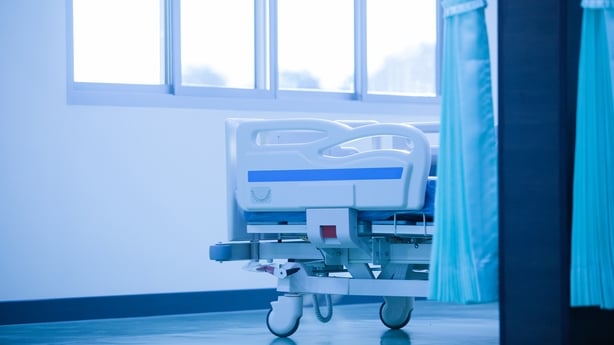The General Secretary of the Irish Nurses and Midwives Organisation has said a cap on recruitment in the health sector will result in the "biggest own goal this country has ever scored".
The INMO and SIPTU are appearing before the Oireachtas Joint Committee on Health to discuss staffing levels.
INMO chief Phil Ní Sheaghdha told the committee that a cap on hiring was "the wrong move".
Health staff undertook industrial action in 2019 to ensure safe staffing levels, she said, but "that rug has simply been pulled out from underneath them".
"There must now be a system whereby the decision about recruitment is taken away from the financial control of the HSE and Department of Health and based on safety for patients."
She urged that HIQA be given the authority to act upon its frequent findings that acute hospitals are not adequately staffed.
"Already this year we know that we are spending around €500,000 extra on agency (staff) a month," she said, noting that this "defeats the purpose of any moratorium".
The overspend this year compared to last in nursing and midwifery alone will be €6 million, Ms Ní Sheaghdha told the committee.
The caps and recruitment freeze "will be very, very damaging. To patients, to retention. It's going to increase burnout".
Health Minister Stephen Donnelly said that funding is in place for over 3,300 more health staff to be recruited next year.
He said that during the lifetime of the Government, 28,000 extra staff have been employed in the health system, and that Ireland has never had as many health staff as it does now.
He acknowledged there were some clinical community teams which are under significant pressure and need extra staff.
"The moratorium that is still in place is having a profound impact on the delivery of safe patient care while hampering staff morale"
In a document submitted to the committee, Ms Ní Sheaghdha warned that increased demand on services means that "unsafe staffing levels and shortages still exist in our acute hospitals, community, and long-term care settings".
"The human cost and clinical risk has outweighed any financial saving" delivered by the recruitment embargo in the health service, the statement reads.
We need your consent to load this rte-player contentWe use rte-player to manage extra content that can set cookies on your device and collect data about your activity. Please review their details and accept them to load the content.Manage Preferences
"Over 2,000 nursing and midwifery posts have been effectively abolished as they were vacant on 31 December 2023."
"Staffing levels are only going to be compounded by high levels of activity in our hospitals and in the community this winter."
"The moratorium that is still in place is having a profound impact on the delivery of safe patient care while hampering staff morale," she said.
Ms Ní Sheaghdha told the committee that the number of assaults on frontline staff is increasing, adding that this is "connected to the number of staff on duty".
"Development of community services is just going to stall. It's just not going to happen," she added.

For next year, Government funding is provided for 49 extra hospital consultants, 209 internship training places for student nurses, more GP training places and expanded child and adolescent mental health services.
Minister Donnelly said the waiting list fund next year will be €420m.
This is made up of €230m for the National Treatment Purchase Fund and €190m for the HSE Waiting List Action Plan.
Staff shortages impacting treatment of cancer patients
The committee heard that up to 120 cancer patients a day are not getting the treatment they need because of a shortage of radiation therapists.
"Our members do not feel any relief coming from the increases identified in the national health sector budgets," SIPTU Sector Organiser Damian Ginley said.
"Despite talk of record levels of investment many grades and services have not benefited from this investment."
Mr Ginley, who has national responsibility for support grades in the Health Division, said that a shortage of radiation therapists "is leading to increased delays in cancer treatments".
"This staffing crisis has led to at least four cancer treatment machines not being utilised," he said, "meaning that as many as 120 cancer patients are not being dealt with daily due to staffing deficits".
The amount of money being spent on agency staff "is still increasing," he said.
In 2023, it was €647m. From January to May this year, the spend on agency staff "was up 10% to €288m".
He noted that there are ongoing "significant increases in demand for services".
Mr Ginley also submitted a document which cited a survey SIPTU carried out in August.
The "vast majority of respondents worked in an acute hospital setting", with 86% saying that "the recruitment embargo was having either a 'very negative' or ‘somewhat negative’ impact on services and staff".
He noted that 57% of respondents said that the use of agency staff had increased as a result.
"This is just so wrong," Ms Ní Sheaghdha said of delays for cancer treatment services.
There are now waiting lists for nurse-led chemotherapy, she said.
"We never had waiting lists before," she added.
A "very important" scalp-cooling service for those undergoing chemotherapy is no longer being provided in some locations because of a lack of staff "due to the cap on recruitment," she said.
Assaults on nurses more than double
Assaults on nursing staff have more than doubled this year, the committee heard.
They increased from 3,465 for all of 2023, to "well over 4,000" for the first half of this year, Ms Ní Sheaghdha said.
She also revealed that a nurse in a busy maternity hospital in Dublin said that the hospital "had 8,500 births" but is "staffed for 5,000".
"It's impossible to keep going to work and feeling protected."







